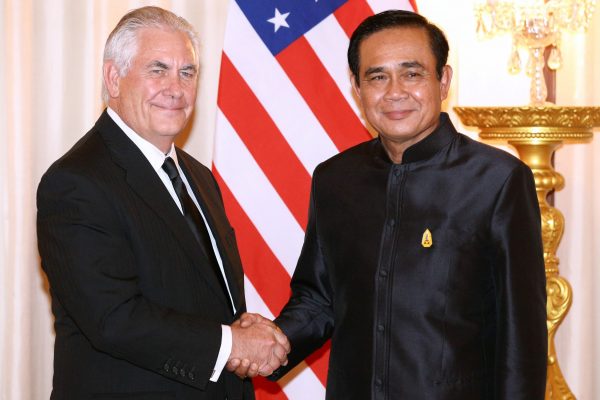Conspicuously absent from Tillerson’s remarks was any criticism of Thailand’s deteriorating human rights record. This apparently pragmatic approach marks a significant shift in Thai–US relations, which cooled considerably after the 2014 military coup led by Prayuth.
It is a rapprochement that permanently threatens Thailand’s already struggling democracy.
In Thailand, symbols matter. Throughout the Cold War, pronouncements of US support for dictatorship were vital in securing the dominance of the Royal Thai Army — US friends ‘aligned’ the military with the principles of freedom and democracy that legitimised their role.
This consensus changed in the early 1990s when a popular movement emerged from within the urban middle class calling for reduced military power and greater accountability. In May 1992, military leaders ordered the suppression of pro-democracy protesters leading to scores of deaths. For many within Thailand, the heavily-censored local media meant that international outlets became the only trusted source of news. With Thailand’s leaders condemned by the international community, it was the protesters who now commanded the respect of global peers.
With the end of the Cold War and communism no longer a threat, authoritarian regimes through Asia were falling or being forced to adapt. It was at this point that King Bhumibol Adulyadej stepped in, aligning his own destiny with the forces of change.
In an exquisitely dramatised exchange broadcast across state media, King Bhumibol sternly encouraged then prime minister Suchinda Kraprayoon to reconcile with enraged civilian leaders. This royal intervention marked a historic breakpoint that was followed by economic deregulation and more democracy. By the beginning of the new millennium, Thailand appeared to have taken its place within a world united around free market economics and liberal politics.
But by 2005 the Thai establishment had grown weary of elections that repeatedly elected populist parties connected to Thaksin Shinawatra. In 2010, the army violently attacked Thaksin-supporting ‘Red Shirt’ protesters. Taking to the internet, the middle classes rallied to support the establishment view that force was necessary. They also joined a chorus of growing disdain for the international media, taking particular issue with what they felt was the uncritical reporting of Red Shirt demands for more democracy. CNN was most notably earmarked for derision.
In late 2013, middle class groups were once again mobilised to topple a Thaksin-linked government, finally provoking the May 2014 coup. Since then, Prayuth’s government and the royalists who support him have been relentless in attempts to extinguish both the influence of Thaksin and the political system that produced him. Many from the middle class have cheered them on.
Today’s Thailand is the polar opposite of what King Bhumibol’s 1992 military–civilian mediation was supposed to foretell. Journalists are silenced, sharing a critical Facebook post can land someone in prison and many who oppose military rule have been forced into exile.
The country also has a new King, Maha Vajiralongkorn, whose erratic behaviour and strongman persona has helped stabilise autocratic rule. Elections are pencilled in for 2018, but the new constitution does more to diminish the institutions and symbols of democracy than reinstate them.
Throughout this time, the Obama administration made it clear that Thailand had veered off course, and the symbolic relationship and professions of friendship that had secured the Junta rapidly deteriorated. Come mid-2016, the country failed to win a non-permanent seat on the United National Security Council, scoring a humiliating loss to Kazakhstan by a vote of 55–193.
But the election of Donald Trump has blurred Thailand’s status as an outlier and threatens to normalise many of those indicators that mark its descent into autocracy. For years now, anti-Thaksin Thais have rallied against CNN and its counterparts as unreliable: a stance parallel to Trump’s daily denunciations of ‘fake news’. Having rejected mainstream international media, conservatives and pro-royalists have turned to a gaggle of Thai nationalists and alt-right US journalists to reaffirm their political positions.
Thai hardliners rail against the conspiracy to topple monarchy in favour of a globalist corporate-led government ushered in by Thaksin and his shadowy backers. Trump’s reliance on the same marginal outlets combined with his disregard for an informed free press resonates with key segments of the Thai elite. At the same time, strongman politics appear all the rage, and with its new King and Prime Minister, Thailand would appear to be ahead of the game.
Having spent a decade seeking to extinguish Thaksin-linked electoral politics, Thailand’s once liberal elite now sits comfortably alongside the most powerful populist movements of the age. History, with its faux teleology proclaiming the inevitable progression toward liberal democracy, has reached its natural conclusion — a dead end.
Matthew Phillips is based in the Department of History and Welsh History at Aberystwyth University.
A longer version of this piece was published here on New Mandala.

